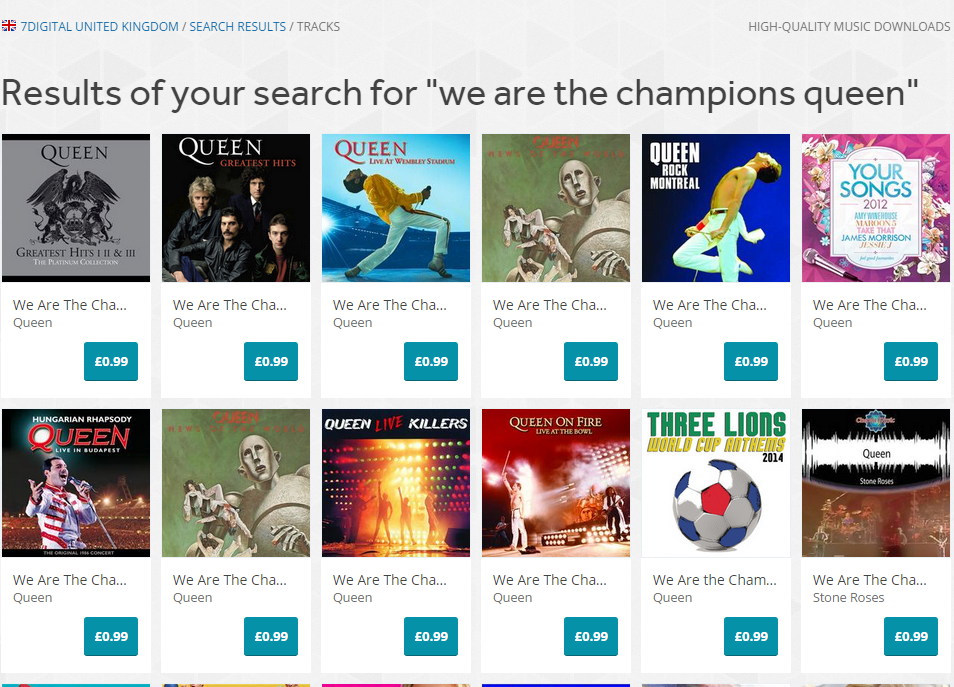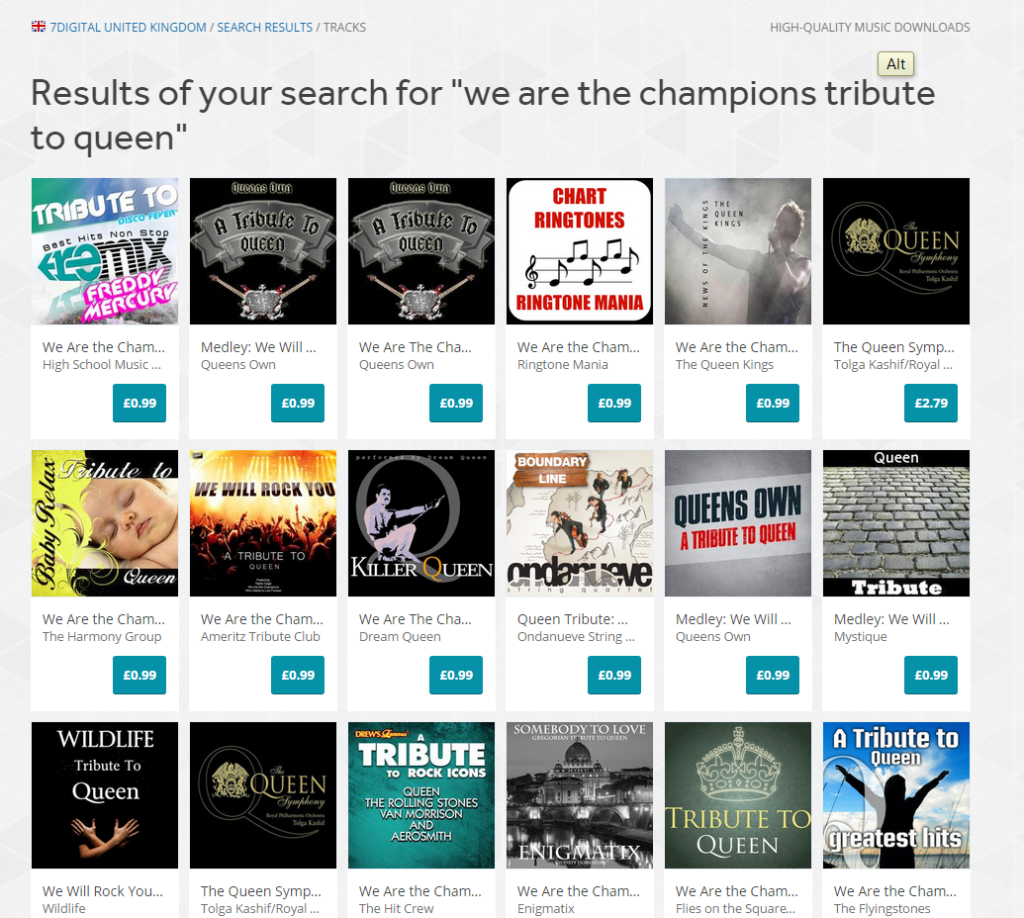Archive for September, 2015
Fixing 7digital’s Music Search, Part Three: The Virtuous Circle of Success
Posted by Michael Okarimia in 7digital, API, Automation, Lucene, search, SOLR on September 25, 2015
This is the third and final post in a series about how we improved the catalogue search at 7digital. You can start at Part one, or skip to Part two
We succeeded in improving 7digital’s music search results accuracy by using customer feedback, application monitoring and metrics, and continuous delivery.
A major factor in allowing us to complete the task was our Continuous Delivery pipeline, comprised of an automated Teamcity deployment process and a test environment which was effectively identical to our production environment.
From the git push of our tests and code, it took 15 minutes to deploy changes to Production. The work flow was automated in the test environment and then finally deployed to production with a human clicking the deploy to PROD button.
From the push, code was compiled, unit and integration tests were run, the application was deployed to test environment automatically and then acceptance tests were run on the test environment.
We would routinely then deploy the new code to only one server in the cluster as a “Canary release” a.k.a “canary deploy” and monitor that server for 10 minutes to ensure it had not adversely affected performance. If the change was for the worse we could immediately roll back the change and deploy the previous version of the code on the “canary server”.
Otherwise after monitoring performance, we would deploy the new code to the remaining production servers, and let our users enjoy the new improvement.
The rapid feedback allowed for multiple deploys to production to be made a day, with low risks of errors, since we practised Test Driven Development.
Beyond the response time, we wanted to analyse the accuracy of the search results themselves on production. To that end we used our Logging Platform built on the ELK stack (Elasticsearch, Logstash, Kibana) to see what the most common search results were, what number of queries were yielding 10 or fewer matching results, all in near real time.
We called this Kibana dashboard our Search quality dashboard.
We measured success by the reduction of query time and improved accuracy of results. As part of the acceptance tests we created acceptance tests which tested the search results for a list of given terms.
SOLR & Lucene search in a nutshell
Lucene is a full text search engine.
A document is sent to Lucene. Lucene will look at the document, analyse it’s fields, convert the text in the fields into terms (a process called tokenising) and store those terms with the document into an index.
An index can contain millions of documents.
This process adding documents to an index is called indexing.
Search terms can be sent to a index to query it. Lucene will return any documents that have terms matching the search term.
SOLR is a web service which wraps around a instance of Lucene. One can send documents to SOLR via HTTP and it will add those into a Lucene index. Queries can also be sent over HTTP to the Lucene index via SOLR and SOLR will return the search results via HTTP too. The index can be administered via HTTP requests sent to the SOLR web service.
Continuously Delivering Search Improvements
For our track & release indexes, creating a new index of the music catalogue on a regular basis meant we could take advantage of the index time features that SOLR offers.
Searches for track and releases used both SOLR and the internal Web API.
The catalogue Web API can accept up to 500 release or track IDs in a single GET request and return the metadata for all of them in a single response. The catalogue API would only fetch the content if the IDs were valid, but would also filter those results based on the complex licensing agreements 7digital have with both the music labels and 7digital’s clients.
This new smaller search index has meant:
- we could create a brand new index within an hour, meaning up to date data (previously, index creation took several days);
- have longer document cache and filter cache durations, which would only be purge at the next full index every 12 hours, this helped performance;
- it was quicker to reflect catalogue updates, as the track details were served from the SQL database which could be updated very rapidly.
Prior to the start of the redesign of 7digital’s catalogue search service, clients had complained that the accuracy of the search results for track and release searches was not useful.
After gathering feed back from users, both internal and external to 7digital, we came up with a list of specific search terms and the expected results, none of which the search algorithm was returned.
We sought to remedy this. This was achieved by modification of the Lucene’s term frequency weighting in the similarity algorithm.
It transpired that to meet our customers expectations we would have to delve into the inner workings of SOLR and Lucene to override the default search behaviour.
Search quality dashboard enabled us to view how search terms were received from clients and how a SOLR query was built and then sent to our SOLR servers.
Filtering out matching yet inconvenient results
Some labels deliberately publish tribute, sound-alike and karaoke tracks with very similar names to popular tracks, in the hope that some customers mistakenly purchase them. These tracks are then ingested into our platform, and 7digital’s contract with those labels means we are obliged to make them available. At the same time, consumers of our search services complain that the karaoke and sound-alike artists are returning in the search results above the genuine artists, mostly because of the repeated keywords in their track and release titles.
In order to satisfy both parties, we decided to override default Lucene implementation of search and exclude tracks, releases and artists that contained certain words in their titles, unless the user specifically entered them in as search term. For example, searching for “We are the champions†now returns the tracks by the band Queen, which is what customers expect. To achieve this we tweaked the search algorithm so all searches by default it will purposefully exclude tracks with the text “tribute to†anywhere in their textual description, be it the track title, track version name, release title, release version name or artist name.
The results look like this: https://www.7digital.com/search/track?q=we%20are%20the%20champions%20queen

Filtering out tribute acts
Prior to the change, all tribute acts would appear in the search results above tracks by the band Queen. To allow tribute acts to still be found, the exclusion rule will not apply if you include the term “tribute to†in your search terms, as evidenced by the results here: https://www.7digital.com/search/track?q=we%20are%20the%20champions%20tribute%20to%20queen

Tribute releases were incorrectly higher in search results
Other music labels send 7digital a sound-alike recording of a popular track, and name it so it’s release title and track tile duplicate the title of a well known track. By ranking results by popularity, the releases with deliberately misleading titles would rank lower in the search results as our customers tended identify the originals and play and purchase them more frequently that the sound-alike releases. This would mean those releases would be calculated to become more popular and at the next index rebuild time would find themselves higher in the search results, thus inducing a virtuous circle.
Tailoring Lucene for music search
Lucene is a capable search engine which specialises in fast full text searches, however the documents it is designed to search across work best when they are paragraph length containing natural prose, such as newspaper articles. The documents that 7digital add to Lucene are models of the metadata of a music track in our catalogue.
Standard implementation of Lucene will give documents containing the same repeated terms a higher scoring match than those that contain a single match. This is means when using the search term: “Michael†results such as “The Best of Michael Jackson†by “Michael Jacksonâ€, will score higher than “Thriller†by “Michael Jackson†because the term “Michael Jackson†is repeated in the first document, but not the second. We solved this issue by overriding the default similarity algorithm in Lucene for our installation of SOLR.
With regard to matching text values this makes sense, but for a music search we want to factor in popularity of our releases based on sales and streams of it’s tracks.
Ignoring popularity leads to a poor user experience; since “Best of Michael Jackson†release is ranked as the first result, despite being much less popular than “Thriller†which is ranked lower in the search results.
Indexed Terms and Stored Terms
The smaller index size meant that we could add fields to each document which weren’t displayed (called stored fields) but could be matched against a search term or influence the search results (called indexed fields). This meant index time features such as filter factories could be applied to certain indexed fields in a document to create terms which would be matched to the client’s search term https://wiki.apache.org/solr/AnalyzersTokenizersTokenFilters
These terms would not be returned in a search result, but were likely to match a user’s search term.
We also added functionality to support auto-complete style searches. Partial search terms could be sent to SOLR and by using Edge n grams filters at index time to create terms we achieved a simple prefix search.
For a document, a shingled and prefix field was added along with fields which were analysed by the standard filters. At query time we could alter the weighting of how important a field was to be when generating the SOLR query.
One useful tokeniser was the Text shingling filter which when applied to track titles such as “How Big, How Blue, How Beautiful” by Florence + The Machine.
The terms generated would include “How Big”, “How Blue”, “How Beautiful”. Search terms sent to Lucene including any of those tokens would match the track document
In addition to tweaking the search algorithm we also could make certain search terms synonymous with others. We created a Git repository on Github with public access; anyone can submit to us a pull request to add new synonyms for our search platform. We can choose to accept the search synonym to our platform and the change will be effected on our search API within 12 hours of our acceptance of change. Repository is here: https://github.com/7digital/synonym-list
Conclusion
Given that there are 40 million tracks in the 7digital catalogue, there is almost endless scope for tweaking the search results. Improving the search algorithms in Lucene to maximise customer happiness was an engaging experience, with the talented team at 7digital I found it to be a highly enjoyable time. We certainly left the music search in a better state than we found it.
And of course, we could upgrade it to Elasticsearch for even more features….